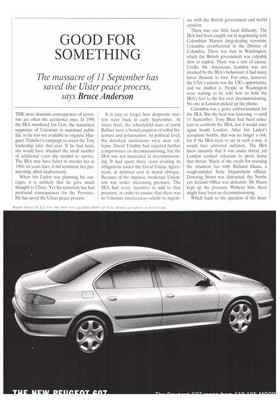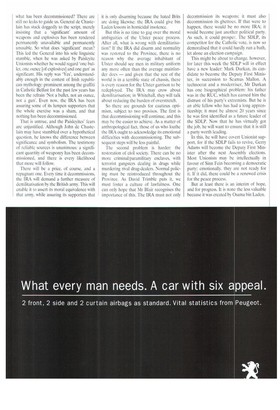GOOD FOR SOMETHING
The massacre of 11 September has saved the Ulster peace process,
says Bruce Anderson
THE most dramatic consequences of terrorism are often the accidental ones. In 1990 the IRA murdered Ian Gow, the staunchest supporter of Unionism in mainland public life, so he was not available to organise Margaret Thatcher's campaign to retain the Tory leadership later that year. If he had been, she would have obtained the small number of additional votes she needed to survive. The IRA may have failed to murder her in 1984: six years later, it did terminate her premiership, albeit inadvertently.
When bin Laden was planning his outrages, it is unlikely that he gave much thought to Ulster. Yet his terrorism has had profound consequences for the Province. He has saved the Ulster peace process. It is easy to forget how desperate matters were back in early September. At street level, the schoolchild wars of north Belfast were a brutal eruption of tribal bitterness and polarisation. At political level, the devolved institutions were near collapse. David Trimble had rejected further compromises on decommissioning, but the IRA was not interested in decommissioning. It had spent three years evading its obligations under the Good Friday Agreement, at minimal cost in moral obloquy. Because of the impasse, moderate Unionism was under increasing pressure. The IRA had every incentive to add to that pressure, in order to ensure that there was no Unionist interlocuteur valable to negoti ate with the British government and world opinion.
There was one little local difficulty. The IRA had been caught out in negotiating with Colombian Marxist drug-dealing terrorists. Colombia reverberated in the District of Columbia. There was fury in Washington, which the British government was culpably slow to exploit. There was a sort of excuse. Unlike the Americans, London was not shocked by the IRA's behaviour; it had many fewer illusions to lose. For once, however, the USA's naivety was the UK's opportunity, and we muffed it. People in Washington were waiting to be told how to hold the IRA's feet to the fire over decommissioning. No one in London picked up the phone.
Colombia was a grave embarrassment for the IRA. But the heat was lessening — until 11 September. Tony Blair had been reluctant to confront the IRA, lest it would once again bomb London. After bin Laden's aeroplane bombs, that was no longer a risk, for if the IRA were to act in such a way, it would face universal outlawry. The IRA knew instantly that it was under threat, yet London seemed reluctant to press home that threat. Much of the credit for rescuing the situation lies with Richard Haass, a tough-minded State Department official. Downing Street was distracted; the Northern Ireland Office was defeatist; Mr Haass kept up the pressure. Without him, there might have been no decommissioning.
Which leads to the question of the hour: what has been decommissioned? There are still no leaks to guide us. General de Chastelain has stuck doggedly to the script, merely insisting that a 'significant' amount of weapons and explosives has been rendered permanently unavailable and permanently unusable. So what does 'significant' mean? This led the General into his sole linguistic stumble, when he was asked by Paisleyite Unionists whether he would regard 'one bullet, one ounce [of explosives] and one gun' as significant. His reply was 'Yes', understandably enough in the context of Irish republican mythology: prominent among the graffiti in Catholic Belfast for the past few years has been the refrain 'Not a bullet, not an ounce, not a gun'. Even now, the IRA has been assuring some of its lumpen supporters that the whole exercise was a sham, and that nothing has been decommissioned.
That is untrue, and the Paisleyites' fears are unjustified. Although John de Chastelain may have stumbled over a hypothetical question, he knows the difference between significance and symbolism. The testimony of reliable sources is unanimous: a significant quantity of weaponry has been decommissioned, and there is every likelihood that more will follow.
There will be a price, of course, and a repugnant one. Every time it decommissions, the IRA will demand a further measure of demilitarisation by the British army. This will enable it to assert its moral equivalence with that army, while assuring its supporters that it is only disarming because the hated Brits are doing likewise: the IRA could give bin Laden lessons in homicidal insolence.
But this is no time to gag over the moral ambiguities of the Ulster peace process. After all, what is wrong with demilitarisation? If the IRA did disarm and normality was restored to the Province, there is no reason why the average inhabitant of Ulster should see men in military uniform any more often than the average mainlander does — and given that the rest of the world is in a terrible state of chassis, there is every reason for the Ulster garrison to be redeployed. The IRA may crow about demilitarisation; in Whitehall, they will talk about reducing the burden of overstretch.
So there are grounds for cautious optimism, subject to two provisos. The first is that decommissioning will continue, and this may be the easier to achieve. As a matter of anthropological fact, those of us who loathe the IRA ought to acknowledge its emotional difficulties with decommissioning. The subsequent steps will be less painful.
The second problem is harder: the restoration of civil society. There can be no more criminal/paramilitary enclaves, with terrorist gangsters dealing in drugs while murdering rival drug-dealers. Normal policing must be reintroduced throughout the Province. As David Trimble puts it, we must foster a culture of lawfulness. One can only hope that Mr Blair recognises the importance of this. The IRA must not only decommission its weapons; it must also decommission its ghettoes. If that were to happen, there would be no more IRA; it would become just another political party. As such, it could prosper. The SDLP, its competitor for the Catholic vote, is now so demoralised that it could hardly run a bath, let alone an election campaign.
This might be about to change, however, for later this week the SDLP will in effect have a new leader: Mark Durkan, its candidate to become the Deputy First Minister, in succession to Seamus Mallon. A technocrat and a moderniser, Mr Durkan has one biographical problem: his father was in the RUC, which has earned him the distrust of his party's extremists. But he is an able fellow who has had a long apprenticeship; it must be almost 20 years since he was first identified as a future leader of the SDLP. Now that he has virtually got the job, he will want to ensure that it is still a party worth leading.
In this. he will have co‘ert Unionist support, for if the SDLP fails to revive, Gerry Adams will become the Deputy First Minister after the next Assembly elections. Most Unionists may be intellectually in favour of Sinn Fein becoming a democratic party; emotionally, they are not ready for it. If it did, there could be a renewed crisis for the peace process.
But at least there is an interim of hope, and for progress. It is none the less valuable because it was created by Osama bin Laden.



















































































 Previous page
Previous page